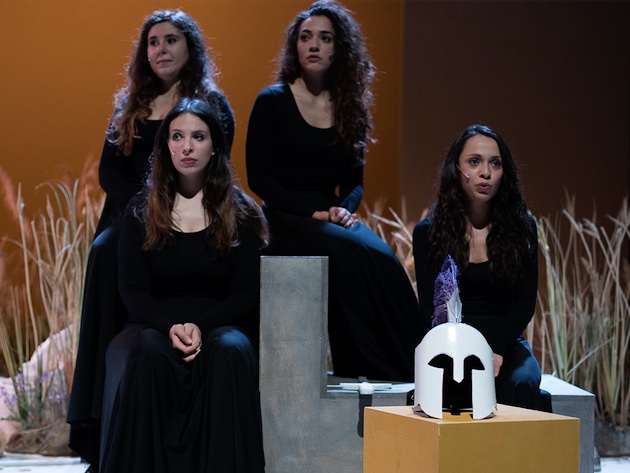
One of Italo Calvino's masterpieces is on stage at the India Theatre: taken from the fantasy novel of the same name, The inexistent knight, written in 1959, constitutes the third chapter of the "heraldic trilogy" entitled Our Ancestors, after The halved discount (1952) and The rampant baron(1957).
The novel, set in the Middle Ages, has legendary outlines, typical of the chivalric epic; the characters are some of Charlemagne's paladins, among whom Agilulf stands out: a disembodied, non-existent knight, under whose white empty armor there is only a strong desire to be, to exist, through willpower and conscience, while Gurdulù, who will become the protagonist's squire over the course of the events, exists even if he is unconscious.. Around these two main figures - one devoid of "physical individuality", the other devoid of "individuality of conscience" - revolve the other characters, through whom the narrative is developed: in particular the young Rambaldo, who represents a sort protagonist together with Agiulfo. Around these two main figures - one devoid of "physical individuality", the other devoid of "individuality of conscience" - revolve the other characters, through whom the narrative is developed: in particular the young Rambaldo, who represents a sort protagonist together with Agiulfo. The story is narrated by the noun Teodora, who tells how, while Charlemagne besieges Paris, Agilulf, after having covered himself in glory, decides to set off in search of Sophronia, a girl he saved fifteen years earlier. Accompanied by the faithful squire Gurdulù, through various vicissitudes, chased by the woman warrior Bradamante who is in love with him, Agilulfo manages to find Sofronia, but believing her to be stained with serious sins, he decides to disappear. So he takes off his armor and gives it to Rambaldo, a young comrade in arms. From this moment on, he will continue the deeds of the disembodied knight, in the white armor that belonged to him.
The staging of the show is entrusted to the skill of four vesatile actresses who, in the guise of peasant nuns, alternate narration and action, image and song, giving voice to the musicality of Calvin's prose. In fact, the four performers evoke the inexistent knight on stage by means of a large puppet, while the rest is entrusted to the interaction between the stage and the audience: thanks to the latter, the inexistent knight represents a magical dimension, where everything is possible, the invisible appears and what does not exist is more real than ever.
Adaptation by Matilde D'Accardi, directed by Tommaso Nuovi and with Francesca Astrei, Maria Chiara Bisceglia, Evelina Rosselli, Giulia Sucapane.
Photo credits: Claudia Pajewski
Informaciones
Dal 22 novembre al 1° dicembre 2024
22 novembre ore 11.00
Tutti gli altri giorni alle ore 19.00
Domenica 24 novembre ore 18.00
Durata 1 ora e 40′
Dai 13 anni
 Condividi
Condividi











































